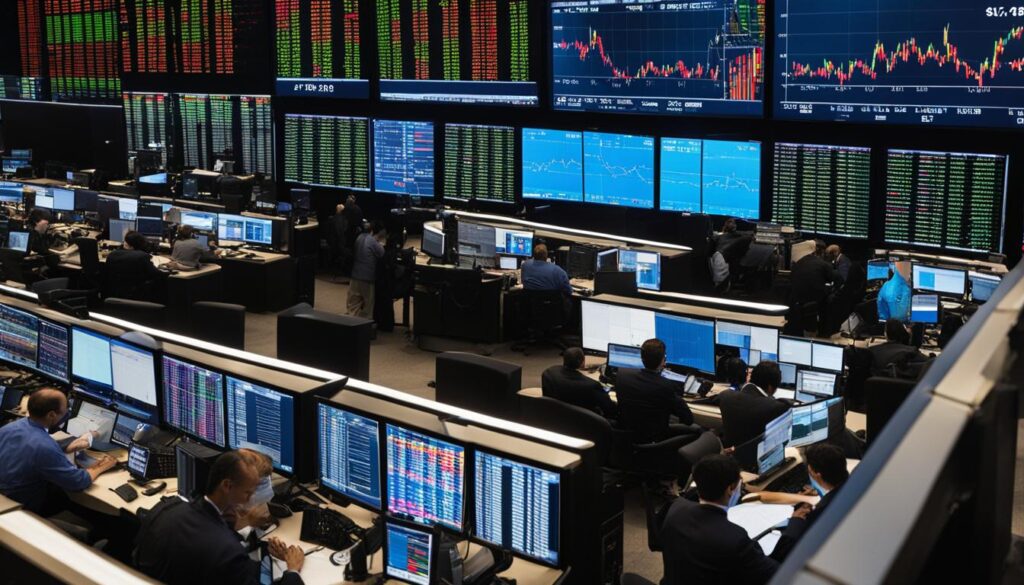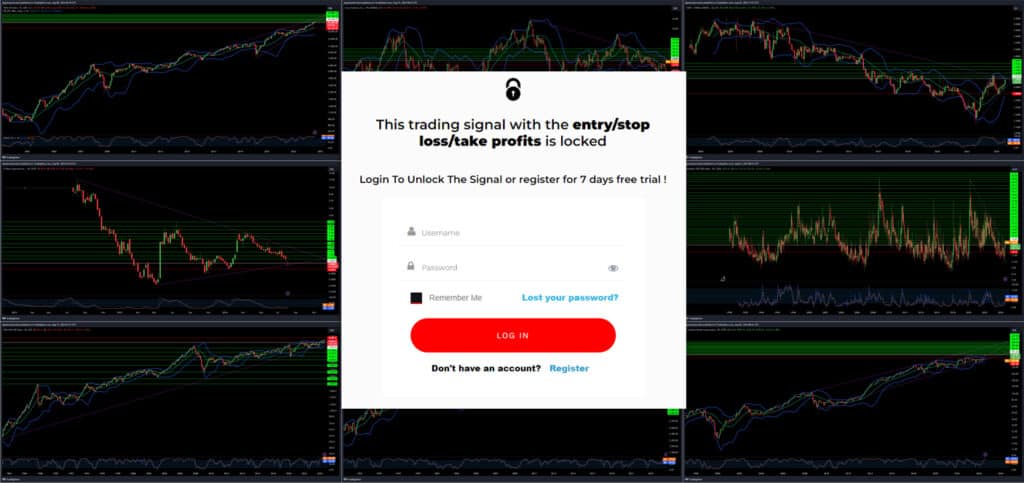I am excited to explore the fascinating world of futures trading in energy markets with you. The energy sector is dynamic and ever-evolving, making it an attractive space for investors and traders seeking opportunities in a volatile market. In this article, we will delve into the intricacies of futures trading in energy markets, understanding the investment strategies deployed to manage risks and capitalize on the potential of this sector.
Key Takeaways:
- Futures trading in energy markets provides lucrative opportunities for both short-term traders and long-term investors.
- Energy futures contracts allow participants to buy and sell energy commodities at a predetermined future price and date.
- The most popular energy futures are based on commodities like crude oil, natural gas, and electricity.
- Energy futures serve as a hedge against price fluctuations and external risks in the volatile energy sector.
- Energy futures can be traded on exchanges like the Chicago Mercantile Exchange (CME) or over-the-counter (OTC).
What Are Energy Futures Contracts?
Energy futures contracts are derivative contracts with energy products as the underlying asset. They allow market participants to buy and sell energy commodities at a predetermined future price and date. The most popular energy futures are based on commodities like crude oil, natural gas, and electricity. These contracts serve as a hedge against price fluctuations and external risks.
Energy futures contracts are used by investors to speculate on future price movements or ensure an efficient hedge against potential risks.
“Energy futures contracts are an essential tool for market participants to manage their exposure to the volatile energy sector. They provide a means to lock in prices and mitigate potential losses caused by fluctuations in energy prices,” says Laura Anderson, a senior analyst at Energy Investments Ltd.
Understanding the Mechanics of Energy Futures Contracts
Let’s take a closer look at how energy futures contracts work. In a typical futures contract, the buyer agrees to purchase a specified quantity of the energy commodity at a predetermined price on a specific date in the future. The seller, on the other hand, commits to deliver the agreed-upon quantity of the commodity at the agreed-upon price and date.
By entering into a futures contract, both the buyer and seller have the obligation to fulfill their respective roles on the contract’s expiration date. However, many futures contracts are closed out before the expiration date through offsetting transactions, where the buyer or seller sells their position to exit the contract.
The price of an energy futures contract is determined by factors such as supply and demand dynamics, geopolitical events, weather conditions, and global economic trends.
To illustrate, here is an example of an energy futures contract:
| Contract Details | Crude Oil Futures |
|---|---|
| Underlying Asset | Crude Oil |
| Contract Size | 1,000 barrels |
| Price Quotation | U.S. dollars per barrel |
| Contract Expiration | Last trading day of the month |
Investors and traders can use energy futures contracts to profit from price movements in the energy markets. They can either take a long position, buying contracts with the expectation that prices will rise, or take a short position, selling contracts with the anticipation that prices will decline.
Overall, energy futures contracts are versatile instruments that provide market participants with opportunities to manage their exposure to the energy sector, speculate on price movements, and protect against price volatility.
Energy Futures Trading vs. Other Derivatives
Energy futures trading is a type of derivative trading that involves buying and selling energy futures contracts. In addition to futures contracts, the energy market offers other derivatives such as options, swaps, and forwards. Each type of derivative has its own unique characteristics and risk profile.
Let’s take a closer look at these various derivatives:
Futures Contracts
Futures contracts are binding agreements that obligate the buyer to purchase and the seller to sell an asset at a predetermined price and date in the future. In the context of energy futures trading, these contracts allow market participants to speculate on the future price movements of energy commodities. Futures contracts are traded on exchanges and provide a standardized framework for trading.
Forwards
Forwards are similar to futures contracts but are traded over-the-counter (OTC) rather than on formal exchanges. They are customizable agreements between two parties to buy or sell an underlying asset at a specified future date and agreed-upon rate. Forwards provide flexibility in terms of contract terms and are often used by market participants with specific needs.
Options
Options give the holder the right, but not the obligation, to buy (call option) or sell (put option) a contract at a predetermined price within a specified period. Options provide a greater level of flexibility and strategic opportunities for traders. They can be used to hedge against potential risks or to speculate on future price movements.
Swaps
Swaps involve the exchange of cash flows between two parties at specified intervals in the future. In the energy market, swaps can be used to manage risk exposure or to exploit differences in interest rates or commodity prices. Swaps are often customized contracts that offer more flexibility compared to other derivatives.
Energy futures trading offers market participants a range of options to manage risk and speculate on the future price movements of energy commodities. From standardized futures contracts to customized forwards, options, and swaps, traders can choose the derivative that best suits their investment strategy and risk appetite.
In summary, energy futures trading is just one aspect of the broader derivatives market in the energy sector. Understanding the differences between futures contracts, forwards, options, and swaps is crucial for market participants looking to navigate the intricacies of energy trading.
| Derivative | Definition | Trading Platform |
|---|---|---|
| Futures Contracts | Binding agreements to buy or sell an asset at a predetermined price and date in the future. | Exchanges like the Chicago Mercantile Exchange (CME) |
| Forwards | Customizable agreements between two parties to buy or sell an underlying asset at a specified future date and rate. | Over-the-counter (OTC) |
| Options | Contracts that provide the right, but not the obligation, to buy or sell a contract at a predetermined price within a specified period. | Exchanges and over-the-counter (OTC) |
| Swaps | Contracts involving the exchange of cash flows on a future date. | Over-the-counter (OTC) |
Where Are Energy Futures Traded?
Energy futures can be traded on a formal exchange or over-the-counter (OTC). The Chicago Mercantile Exchange (CME), specifically the New York Mercantile Exchange (NYMEX), is the most popular market for energy futures. Other popular trading venues include Tokyo TOCOM and the Intercontinental Exchange (ICE).
On these exchanges, traders input their orders into a central clearinghouse, which matches buyers and sellers. Energy futures can also be traded OTC, where traders rely on a counterparty to handle the process.
Retail traders can buy and sell energy futures through various brokers, as energy futures are widely supported by financial service providers.
| Exchange | Market | Location |
|---|---|---|
| Chicago Mercantile Exchange (CME) | Energy futures | Chicago, United States |
| New York Mercantile Exchange (NYMEX) | Energy futures | New York, United States |
| Tokyo TOCOM | Energy futures | Tokyo, Japan |
| Intercontinental Exchange (ICE) | Energy futures | London, United Kingdom |
Conclusion
Futures trading in energy markets presents a wealth of opportunities for investors and traders alike to capitalize on the price fluctuations of energy commodities. With energy futures contracts being actively traded on exchanges like the Chicago Mercantile Exchange (CME) and available over-the-counter (OTC), market participants have access to a diverse range of trading options. These contracts provide a valuable hedge against the volatile nature of the energy sector, allowing investors to mitigate risks associated with price unpredictability.
Successful futures traders employ various investment strategies to manage their positions effectively and maximize their potential returns. Whether it’s trend following, spread trading, or options strategies, market participants can tailor their approaches to suit their risk appetite and market outlook. By carefully analyzing market trends and fundamental factors, traders can make informed decisions and maintain a profitable edge in the energy futures market.
As the global demand for energy continues to rise, the energy futures market is expected to remain dynamic and lucrative for investors and traders. This sector’s ever-changing landscape necessitates a thorough understanding of market dynamics, anticipating global events, and staying informed about industry trends. With the right strategies and risk management techniques in place, market participants can navigate the volatile energy sector and make the most of the opportunities it presents.
FAQ
What is futures trading in energy markets?
Futures trading in energy markets involves buying and selling energy futures contracts, which allow market participants to speculate on future price movements or hedge against potential risks in the volatile energy sector.
What are energy futures contracts?
Energy futures contracts are derivative contracts with energy products as the underlying asset. They enable market participants to buy and sell energy commodities at a predetermined price and date, serving as a hedge against price fluctuations and external risks.
How does energy futures trading differ from other derivatives?
Energy futures trading involves buying and selling futures contracts, while other derivatives in the energy market include options, swaps, and forwards. Each type of derivative has its own risk profile and trading characteristics.
Where can energy futures be traded?
Energy futures can be traded on a formal exchange, such as the Chicago Mercantile Exchange (CME), or over-the-counter (OTC). Other popular trading venues include Tokyo TOCOM and the Intercontinental Exchange (ICE).
What opportunities does futures trading in energy markets offer?
Futures trading in energy markets offers investors and traders opportunities to profit from the price movements of energy commodities while managing risks in the volatile energy sector.
Source Links
- https://www.earn2trade.com/blog/energy-futures-trading/
- https://www.ecb.europa.eu/pub/financial-stability/fsr/special/html/ecb.fsrart202211_01~173476301a.en.html
- http://web.mit.edu/rpindyck/www/Papers/Dynamics_Comm_Spot.pdf
Disclaimer
All information on this website is of a general nature. The information is not adapted to conditions that are specific to your person or entity. The information provided can not be considered as personal, professional or legal advice or investment advice to the user.
This website and all information is intended for educational purposes only and does not give financial advice. Signal Mastermind Signals is not a service to provide legal and financial advice; any information provided here is only the personal opinion of the author (not advice or financial advice in any sense, and in the sense of any act, ordinance or law of any country) and must not be used for financial activities. Signal Mastermind Signals does not offer, operate or provide financial, brokerage, commercial or investment services and is not a financial advisor. Rather, Signal Mastermind Signals is an educational site and a platform for exchanging Forex information. Whenever information is disclosed, whether express or implied, about profit or revenue, it is not a guarantee. No method or trading system ensures that it will generate a profit, so always remember that trade can lead to a loss. Trading responsibility, whether resulting in profits or losses, is yours and you must agree not to hold Signal Mastermind Signals or other information providers that are responsible in any way whatsoever. The use of the system means that the user accepts Disclaimer and Terms of Use.
Signal Mastermind Signals is not represented as a registered investment consultant or brokerage dealer nor offers to buy or sell any of the financial instruments mentioned in the service offered.
While Signal Mastermind Signals believes that the content provided is accurate, there are no explicit or implied warranties of accuracy. The information provided is believed to be reliable; Signal Mastermind Signals does not guarantee the accuracy or completeness of the information provided. Third parties refer to Signal Mastermind Signals to provide technology and information if a third party fails, and then there is a risk that the information may be delayed or not delivered at all.
All information and comments contained on this website, including but not limited to, opinions, analyzes, news, prices, research, and general, do not constitute investment advice or an invitation to buy or sell any type of instrument. Signal Mastermind Signals assumes no responsibility for any loss or damage that may result, directly or indirectly, from the use or dependence on such information.
All information contained on this web site is a personal opinion or belief of the author. None of these data is a recommendation or financial advice in any sense, also within the meaning of any commercial act or law. Writers, publishers and affiliates of Signal Mastermind Signals are not responsible for your trading in any way.
The information and opinions contained in the site are provided for information only and for educational reasons, should never be considered as direct or indirect advice to open a trading account and / or invest money in Forex trading with any Forex company . Signal Mastermind Signals assumes no responsibility for any decisions taken by the user to create a merchant account with any of the brokers listed on this website. Anyone who decides to set up a trading account or use the services, free of charge or paid, to any of the Broker companies mentioned on this website, bears full responsibility for their actions.
Any institution that offers a service and is listed on this website, including forex brokers, financial companies and other institutions, is present only for informational purposes. All ratings, ratings, banners, reviews, or other information found for any of the above-mentioned institutions are provided in a strictly objective manner and according to the best possible reflection of the materials on the official website of the company.
Forex/CFD trading is potentially high risk and may not be suitable for all investors. The high level of leverage can work both for and against traders. Before each Forex/CFD investment, you should carefully consider your goals, past experience and risk level. The opinions and data contained on this site should not be considered as suggestions or advice for the sale or purchase of currency or other instruments. Past results do not show or guarantee future results.
Neither Signal Mastermind Signals nor its affiliates ensure the accuracy of the content provided on this Site. You explicitly agree that viewing, visiting or using this website is at your own risk.




